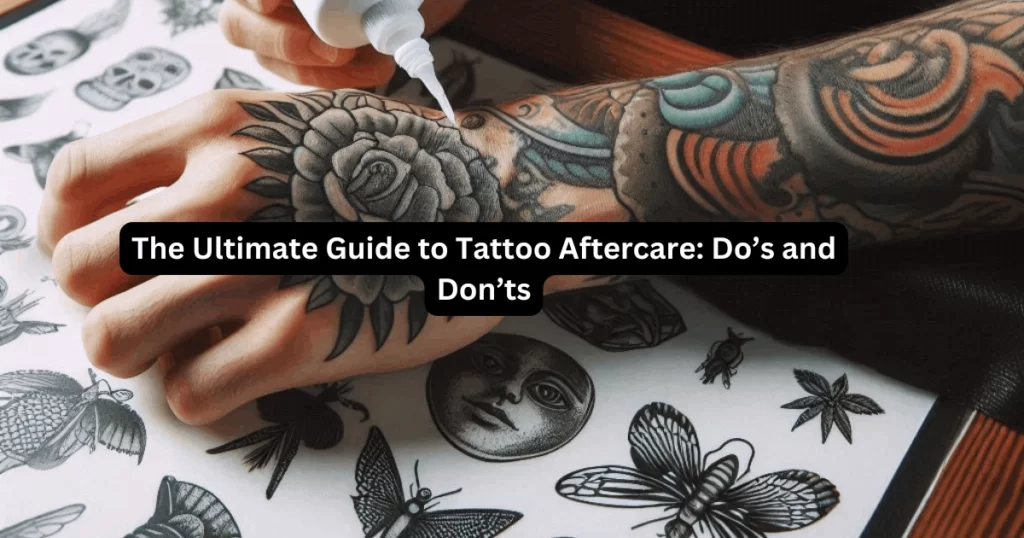Getting a new tattoo is exciting, but it also requires careful aftercare, especially when it comes to sleeping. In the first few nights after getting a tattoo, you must be mindful of your sleeping habits to avoid damaging the fresh ink.
Here are some tips on sleeping with a new tattoo.
How Do I Sleep With A New Tattoo
1. Keep Your Tattoo Clean Before Bed
Before you go to bed, clean your tattoo. Fresh tattoos are open wounds, so they need to be kept clean to prevent infection. Gently wash your tattoo with lukewarm water and a mild, fragrance-free soap.
Avoid scrubbing the area; instead, use your fingertips to clean it. After washing, pat the tattoo dry with a clean paper towel. Avoid using a cloth towel, as it might harbor bacteria.
Once your tattoo is clean and dry, apply a thin layer of the ointment recommended by your tattoo artist. This will keep the tattoo moist and prevent it from drying out overnight. Be careful not to over-apply, as too much ointment can suffocate the skin and slow down the healing process.
2. Use the Right Bedding
Your bedding plays a crucial role in how your tattoo heals. Fresh ink can stick to fabrics, especially if the area sweats or rubs against your sheets. To prevent this, choose soft, breathable bedding made of natural fibers like cotton. Avoid using rough materials that can irritate your skin.
It’s also a good idea to use old sheets that you don’t mind staining. Tattoos can ooze ink, plasma, and other fluids during the first few nights. This might cause stains, which can be difficult to remove from light-colored sheets. If possible, use dark-colored sheets or an old blanket to protect your bed.
3. Choose the Right Sleeping Position
Your sleeping position matters when you have a new tattoo. You need to avoid putting pressure on the tattooed area, as this can cause irritation or smudging.
If your tattoo is on your back, stomach, or side, try to sleep on the opposite side. For example, if you have a tattoo on your right arm, sleep on your left side.
Sleeping on your back is often the best position, as it keeps most tattoos from touching the bed. However, this may not be possible if your tattoo is on your back. In such cases, try to create a barrier between the tattoo and your bedding. This can be done by placing a clean towel or cloth underneath the tattooed area.
4. Protect Your Tattoo with a Bandage
For the first few nights, you may want to cover your tattoo with a bandage before going to sleep. This helps protect the tattoo from friction and keeps it clean. However, not all tattoos need to be bandaged. Follow your tattoo artist’s instructions on whether or not to cover your tattoo.
If your artist suggests using a bandage, make sure it’s a sterile, non-stick bandage. Avoid using plastic wrap, as it doesn’t allow the tattoo to breathe.
Secure the bandage loosely with medical tape, ensuring it covers the entire tattoo without being too tight. In the morning, remove the bandage and let your skin breathe.
5. Keep the Tattoo Elevated
Swelling is common with new tattoos, especially on the legs and arms. If your tattoo is in one of these areas, try to keep it elevated while you sleep. This reduces blood flow to the area, which can help minimize swelling and discomfort.
To elevate your tattoo, place a pillow or folded blanket under the tattooed limb. This will help keep it raised throughout the night. If you find this uncomfortable, adjust the elevation until you find a position that works for you.
6. Avoid Sleeping with Pets
Pets are great companions, but they can pose a risk to your new tattoo. Pet hair, dander, and bacteria can easily transfer to your tattoo while you sleep. This increases the risk of infection and can irritate the healing skin.
To protect your tattoo, avoid letting pets sleep in your bed for the first few nights. If you can’t keep them out of the bedroom, at least ensure they don’t come into contact with the tattooed area. This might mean temporarily adjusting your pet’s sleeping arrangements.
7. Don’t Scratch or Pick at the Tattoo
As your tattoo heals, it may start to itch. This is a normal part of the healing process, but it can be frustrating, especially at night. It’s important not to scratch or pick at your tattoo, as this can damage the skin and cause scarring.
If the itching becomes unbearable, try gently tapping the area or applying a cold compress. You can also try distracting yourself with deep breathing or focusing on something else.
8. Avoid Alcohol and Caffeine
Both alcohol and caffeine can disrupt your sleep and should be avoided, especially after getting a new tattoo. Alcohol can thin your blood, which may increase bleeding from the tattooed area and slow down the healing process. It can also dehydrate you, which is not good for your skin.
Caffeine, on the other hand, can keep you awake and make it harder to sleep. Sticking to water and herbal teas before bed will help your body and tattoo heal more effectively.
Listen to Your Body
Finally, listen to your body. If you’re feeling pain or discomfort while sleeping with a new tattoo, don’t ignore it. Adjust your position, use pillows for support, or take a pain reliever if needed.
The healing process can take a few weeks, and during this time, you should continue to be mindful of how you sleep. Even after the first few nights, try to sleep in a position that avoids putting pressure on the tattoo.




